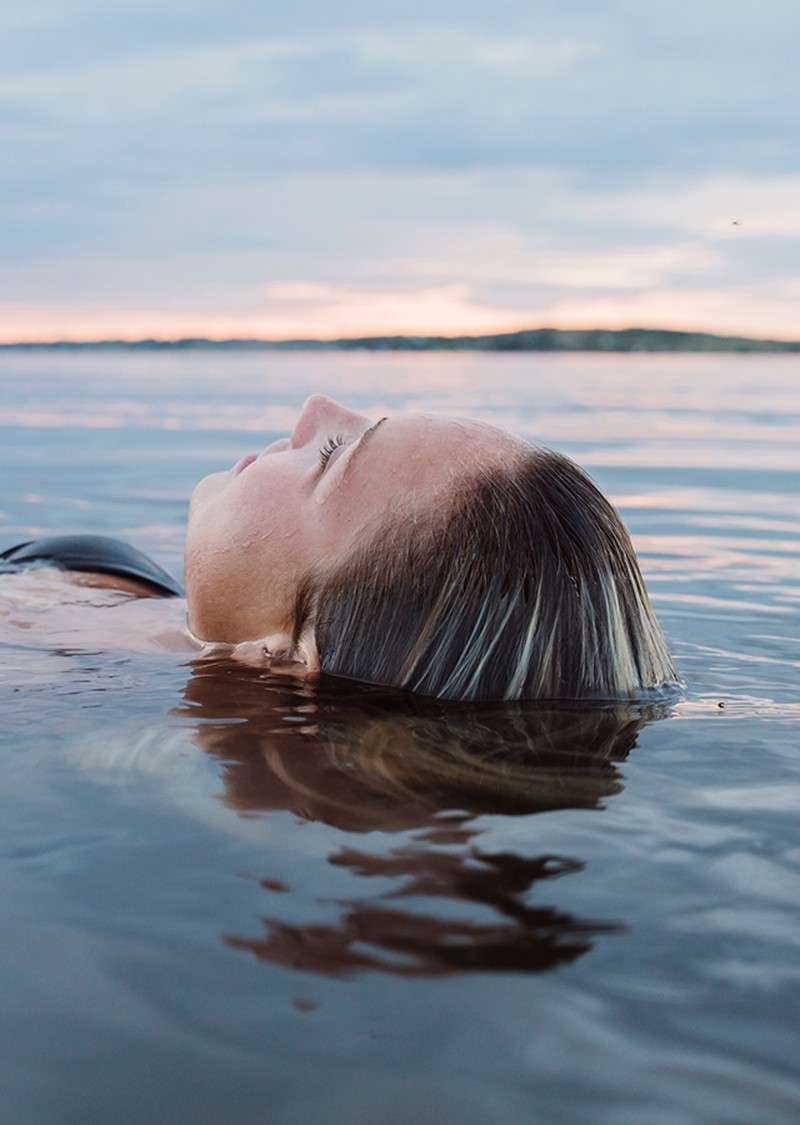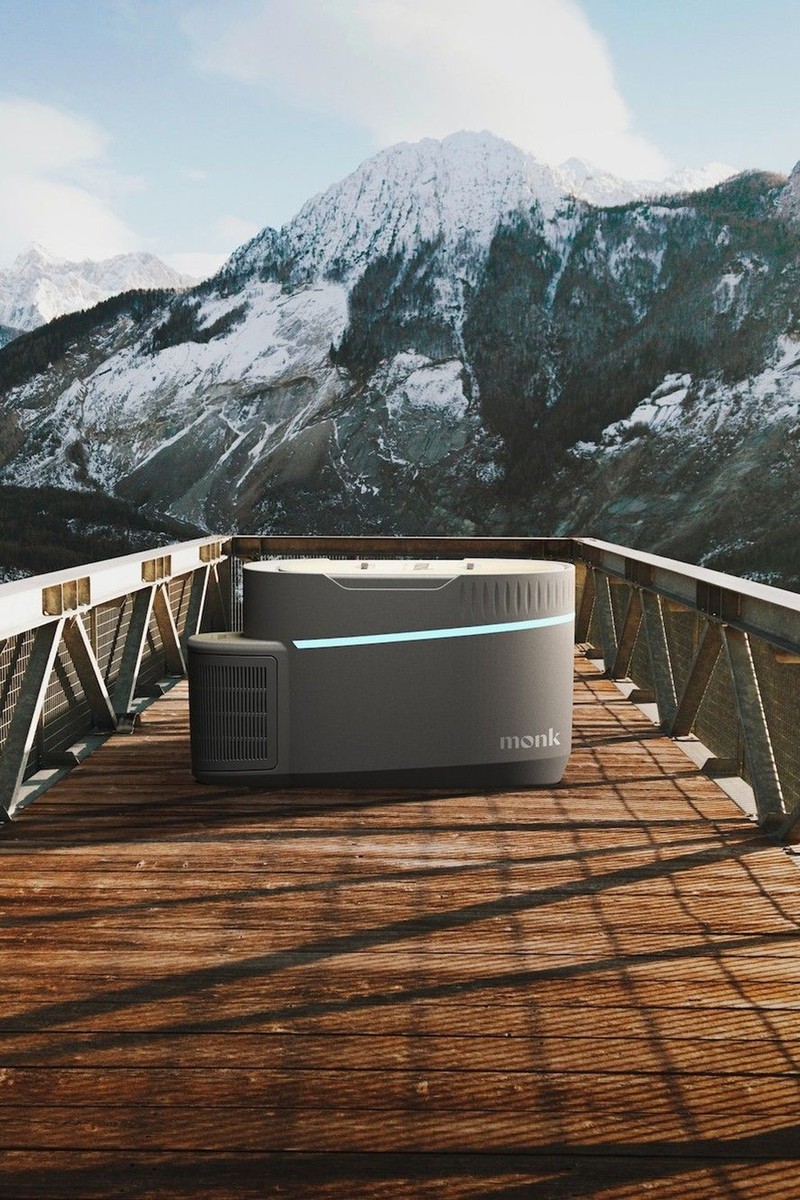How Cold Water Therapy Could Make You Fitter & Happier
THE BENEFITS
Enhanced Energy: The temperature shock you feel from a cold shower – or cold dip from wild swimming – gives a shock to the body that increases heart rate. This, in turn, stimulates blood flow and oxygenates cells, which enhances alertness. “Deliberate cold exposure causes a significant release of adrenaline and noradrenaline,” explains Andrew Walters, head of fitness at The Club by Bamford. “These two neurochemicals make us feel alert and energised, and cold causes their levels to stay elevated in the body.”
Better Mood: “Submersion in water at 14°C or lower has been shown to increase levels of dopamine, the happy hormone, by 250%,” adds Laura Fullerton, founder and CEO of Monk. “This explosion of neurotransmitters fires across trillions of synapses to ignite every cell in the body, leading to feelings of euphoria and making your happiness soar. It also relieves pain and depression, and makes you feel on top of the world.”
Pain Relief: One of the most touted benefits of cold-water therapy is its ability to help with pain relief. “Exposure causes blood vessels to constrict, which can help to numb and reduce pain,” says Andrew. It’s believed the cold also reduces muscle fatigue and soreness.
Stress Resilience: “Cold exposure provides incredible training for the mind,” says Andrew. “Forcing yourself to embrace the stress of cold water engages ‘top-down control’ over the deep brain centres involved in planning and suppressing impulsivity. This top-down control is what people refer to when they talk about mental resilience.” Regularly engaging in cold-water therapy is proven to help you remain calm, cope better and have a clearer mind when subjected to real-world stressors.
Metabolism Efficacy: A cold plunge increases ‘brown fat’, the metabolically active form of fat that uses energy as opposed to storing it. “Brown fat, unlike white fat, has been linked to increased metabolism and lower risk of obesity,” says Laura.
Better Immunity: Research shows cold showers increase the amount of white blood cells in the body, and one study found people who took regular cold showers took fewer sick days.
Improved Lymphatic System: Exposing the body to cold water supports your lymphatic system, a network of vessels that help the body to cleanse itself of waste and bacteria. Cold water causes these vessels to contract and pump lymph fluid around the body, getting rid of waste and toxins.
HOW TO GET STARTED
Turn Down Your Shower
Taking a cold shower in the depths of winter may not sound like the most appealing way to start the day, but experts agree it’s the best place to experiment with cold exposure. “Cold-water therapy doesn’t have to mean plunging yourself into an ice bath,” says Andrew. “If jumping into icy water gives you the chills, start with a contrast shower, which will gently help you adjust to cooler temperatures.” If you’re a beginner, aim for ten seconds of warm water followed by 20 seconds of cold, aiming to have the water as cold as possible. “Complete ten rounds, which will take you to five minutes, which is the minimum dose required for effectiveness,” says Andrew. Wondering how cold you need to go? Andrew recommends starting at around 10°C, although we all have unique thresholds. “Cold water should make you think, ‘Wow, this is really cold and I want to leave.’ For some people, it may be 15°C, for others 6°C. The colder the water, the less amount of time you need to be exposed to it.”
Focus On Your Breathing
To reap the benefits and give your body the chance to adjust to cold exposure, you have to think about the breath, says wellness expert Marie Reynolds. “Cold water constricts blood vessels, which tightens muscles and the skin. If you expose the body to icy water and panic, this can be detrimental. Breathing plays a huge role in lowering your cortisol levels and calming the mind.” Experts recommend focusing on your breathing and treating your cold shower like a meditation. “Even a few seconds of cold exposure will give you good benefits when combined with breathwork,” says Marie.
Stick With It
“It’s becoming more widely accepted that cold water is great for you, but that it’s uncomfortable, and for many people, this is a barrier to starting,” says Laura. “The incredible thing about cold water therapy is that the benefits and surge of endorphins are immediate, so the instant reward makes the short-term discomfort worth it. If you’re struggling, commit to a cold shower every day for one week, then see how you feel. It’s amazing how quickly people notice that they generally feel lighter, happier and more focused.”
Want to take things up a notch? Daniela Bohling and Millie Dornan, co-founders of Wylding, share their tips for dipping your toe into wild swimming…
Start In The Summer: “If you have access to a lido, river, lake or the sea, consider starting swimming in mid-summer, when the water temperature is higher, then continue through the colder months. This will allow your body to gently adapt.”
Know Your Water: “We were cavalier with our first wild swim, and all 15 of us (all first-timers to cold-water swimming and all first timers to that location) ambled into a fast-flowing river only to be swept downstream. We had to cling onto a low-hanging tree branch while traversing the strong current to clamber out of the water. Don’t make this mistake. Have an exit strategy at all times and understand the conditions.”
Walk In Gradually: “Think slow, steady and strong. When entering cold water, never jump or dive. If you do, you’re likely to hyperventilate and will struggle to get your breathing under control. This can be particularly dangerous if you’re also contending with unexpected current conditions. Walk in gradually but try to keep moving. The trickiest moment will be when the cold water reaches the small of your back but bull on through. Try not to inhale when cold water reaches your chest – this moment is all about the exhale: long, deep and slow. This will tell your brain to tell your body to remain calm.”
Don’t Stay In Long: “A couple of minutes is perfect, especially as a beginner. Test the waters and understand and process how your body responds to the experience. If you are in an open body of water, stay close to the edge until you know you can handle the temperature. Soon after entering, your body will start to heat up as your system starts to overcompensate. Do not be deceived by this and do not stay in too long as your limbs will become tired and weaker as energy is expended on keeping the body warm. This is where neoprene gloves can come in handy – if you find yourself running out of steam and are a distance from the bank, cup your hands and use them as paddles to get you to safety.”
Beware Of The After-Drop: “When you get out of the water, get dressed immediately and ensure your torso is well-insulated to protect your core organs (heart and lungs) as well as your pulses (wrists and ankles) and then your extremities. If you delay this, it will lead to an after-drop and you’ll be unable to warm up for the rest of the day. Once you are wrapped up, have a hot drink and eat something sweet.”
For more information and inspiration, visit BamfordClub.com, Wylding.co.uk, DiscoverMonk.com & MarieReynoldsLondon.com.
DISCLAIMER: Features published by SheerLuxe are not intended to treat, diagnose, cure or prevent any disease. Always seek the advice of your GP or another qualified healthcare provider for any questions you have regarding a medical condition, and before undertaking any diet, exercise or other health-related programme.
DISCLAIMER: We endeavour to always credit the correct original source of every image we use. If you think a credit may be incorrect, please contact us at info@sheerluxe.com.



